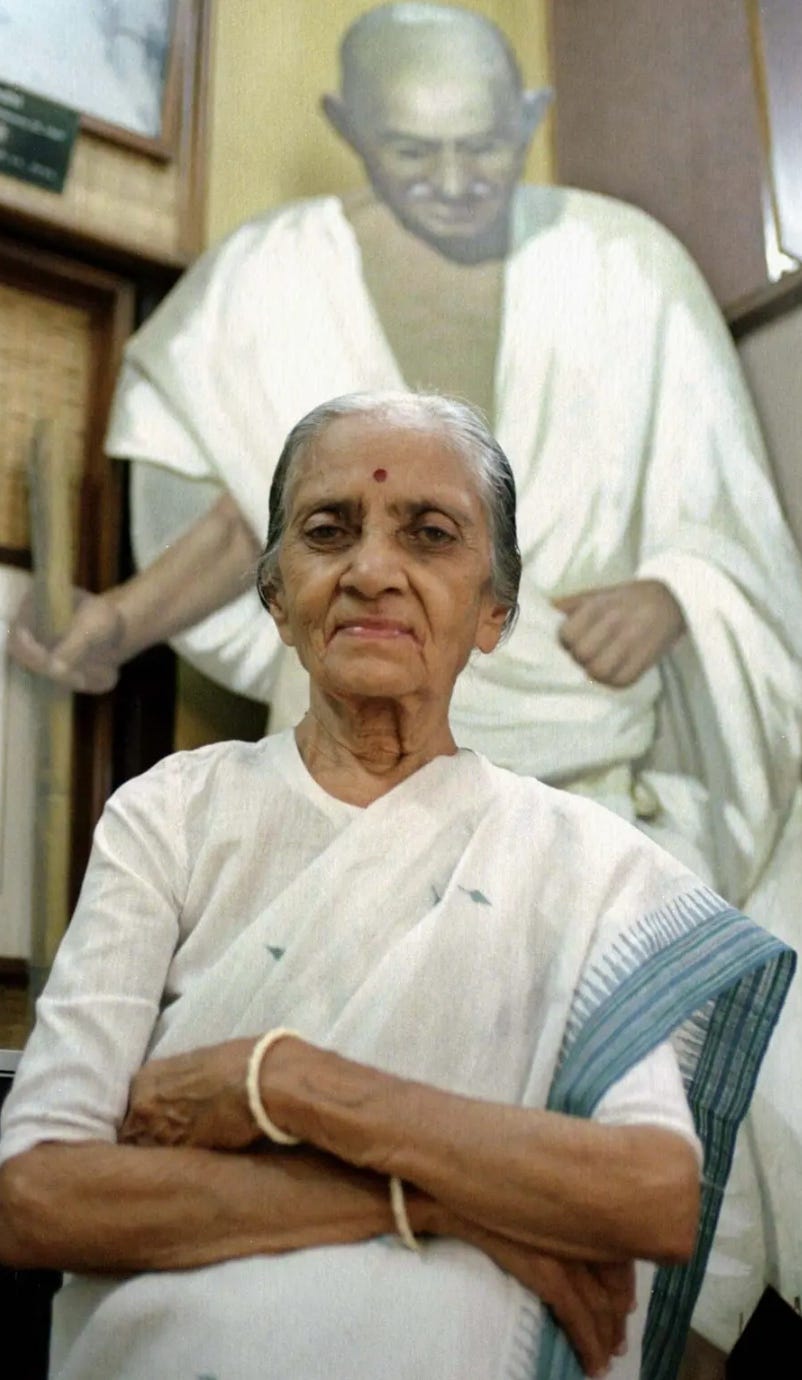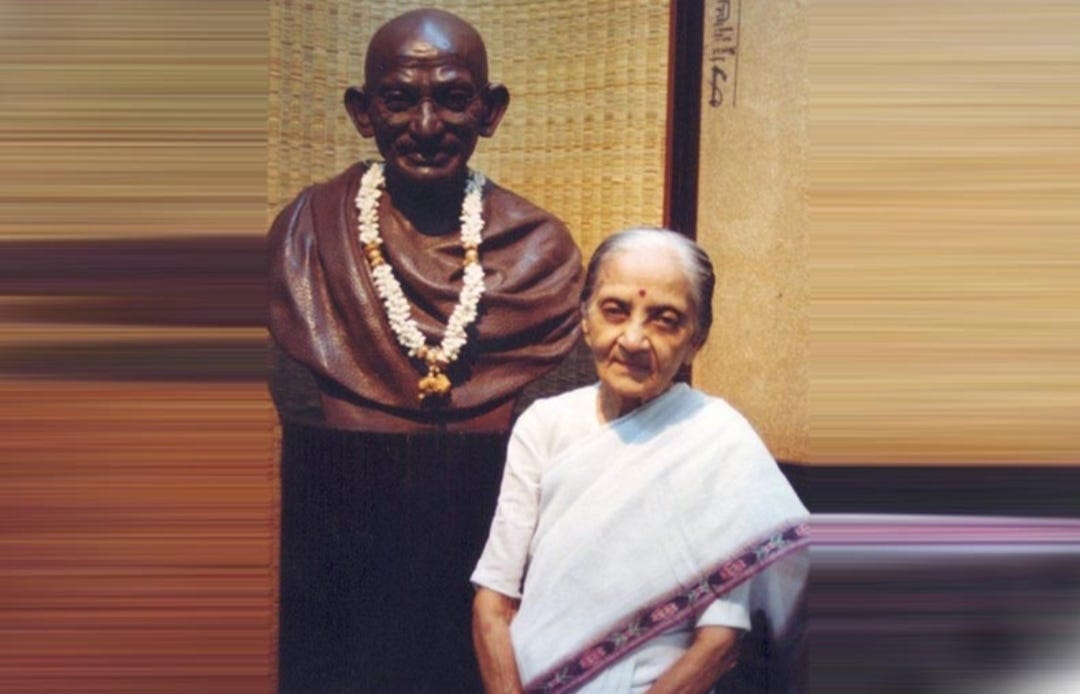Usha Mehta: Echoes of Independence in the Airwaves
Today I’m going to share a tapestry of woman who courageously fought against the British Raj.
Usha Mehta was born on 25 March 1920 in Saras, a village near Surat in modern-day Gujarat. At the age of five year, she first saw Gandhi while on a visit to his Asharam in Ahmedabad. Shortly afterwards, Gandhi arranged a camp near her village in which little Usha participated, attending sessions and doing a little spinning. In 1928, when she was eight-year-old Usha participated in in a protest march against the Simon Commission and shouted her first words of protest against the British Raj: "Simon Go Back." She and other children participated in early morning protests against the British Raj and picketing in front of liquor shops. During one of these protests marches, the policemen charged the children, and a girl carrying the Indian flag fell down along with the flag. Angry at this incident, the children took the story to their parents. The elders responded by dressing up the children in the colours of the Indian flag (saffron, white and green) and sending them out in the streets a few days later. Dressed in the colours of the flag, the children marched again, shouting: "Policemen, you can wield your sticks and your batons, but you cannot bring down our flag."
Usha's initial schooling was in Kheda and Bharuch and then in Chandaramji High School, Bombay. She was an average student. In 1935, her matriculation examinations placed her among the top 25 students in her class. She continued her education at Wilson College, Bombay, graduating in 1939 with a first-class degree in philosophy. She also began studying law, but ended her studies in 1942 to join the Quit India Movement. Thereafter, beginning at age 22, she participated in the freedom movement full-time.
This is only an excerpt from the life of courageous Usha Mehta. Let's talk further on her life.
On 9 August 1942, When Mahatma Gandhi gave his famous speech “Do or Die” and announced the nationwide Quit India Movement would commence with a rally at the Gowalia Tank grounds in Mumbai. Nearly all leaders including Gandhi were arrested before that date. However, a vast crowd of Indians gathered at Gowalia Tank Ground on the appointed day. It was left to a group of junior leaders and workers to address them and hoist the national flag.
On 14 August 1942, Usha and some of her close associates, who was 22 at the time, secured a ghost transmitter and started an underground radio station to amplify Gandhi’s message.
It went air on 27 August. The first words broadcast in her voice were: "This is the Congress radio calling on [a wavelength of] 42.34 meters from somewhere in India." Her associates included Vithalbhai Jhaveri, Chandrakant Jhaveri, Babubhai Thakkar and Nanka Motwani, owner of Chicago Radio, who supplied equipment and provided technicians. Many other leaders, including Dr. Ram Manohar Lohia, Achyutrao Patwardhan and Purushottam Trikamdas, also assisted the Secret Congress Radio. The radio broadcast recorded messages from Gandhi and other prominent leaders across India. To elude the authorities, the organizers moved the station's location almost daily.
Mehta and others relayed news, patriotic speeches and appeals directed at the people she called “workers in the struggle” — students, lawyers and police officers. She passed along information from the All India Congress Committee and delivered messages from across the country.
The broadcasts were originally once a day but quickly transitioned to twice a day: once in the morning and once in the evening, in both English and Hindustani.
They also reported on the Jamshedpur Strike, as labor workers from the Tata Iron and Steel Company, the largest integrated steel mill in the British Empire, went on strike for 13 days in support of the Quit India movement and demanded that a national government be formed.
And they told the nation about the deadly riots in Ashti and Chimur, as the police opened fire on people protesting the arrests of Congress leaders. As the military was sent in to thwart the uprising, accounts of atrocities against the villagers surfaced.
“When the newspapers dared not touch upon these subjects under the prevailing conditions, it was only the Congress Radio which could defy the orders and tell the people what actually was happening,” Mehta said.
Mehta and her colleagues were regularly chased by a police van, forcing them to shift from place to place to hide their location. To avoid further risk, they had a recording station separate from the broadcast station and for a period aired messages across two transmitters.
After the official All India Radio — which other activists referred to as “Anti-India Radio” — jammed their broadcasts, Mehta and her crew persistently tried to retaliate. But their luck fell short on Nov. 12, 1942, when they were caught after a technician betrayed them by revealing their location.
She said in her famous speech that, “When the press is gagged and all news banned, a transmitter certainly helps a good deal in furnishing the public with the facts of the happenings and in spreading the message of rebellion,” Mehta recalled in a 1969 interview.
In August 1947, when India became Independent, there failing health confined to bed and could not attend the official function in New Delhi. The British drew a dividing line that became the border between India and Pakistan, sending the region into chaos that resulted in mass bloodshed as more than 10 million Hindus, Muslims and Sikhs sought to find their place in what would become history’s largest migration.
Mehta was torn. “In a way I was very happy, but sad at the same time because of partition,” she was quoted as saying in the book “Freedom Fighters Remember” (1997). “It was an independent India but a divided India.”
Later in life Mehta wrote the script for a documentary on Gandhi that was produced by one of her colleagues at the radio station. She earned a Ph.D. in Gandhian thought at the University of Bombay, where she taught political science and ran the politics department. She also taught at Wilson College for 30 years. She was president of the Gandhi Peace Foundation and in 1998 received one of India’s highest civilian honors, the Padma Vibhushan.
She lived a simple, even frugal life. She rode the bus instead of driving a car and dressed in khadis, a handwoven garment that became a symbol of defiance in Gandhi’s time. She often subsisted on only tea and bread. She woke at 4 a.m. each day and worked late into the evening.
Mehta never married or had children
She died on Aug. 11, 2000. She was 80.
One morning shortly after Congress Radio’s first broadcast in 1942, Mehta’s uncle brought her a note from Ram Manohar Lohia, the Congress Socialist Party founder.
“I do not know you personally,” the note read, “but I admire your courage and enthusiasm and your desire to contribute your might to the sacrificial fire that has been lit by Mahatma Gandhi.”





